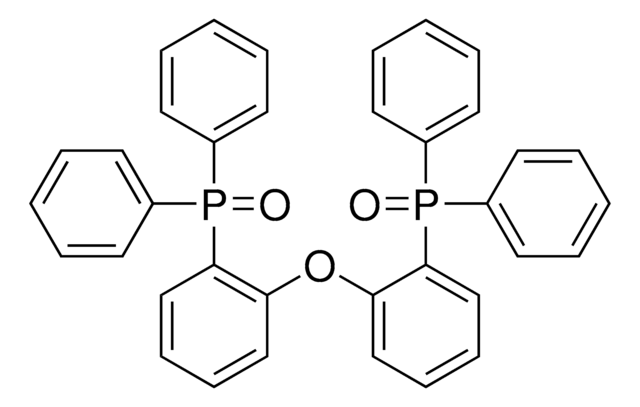806781
TPBi
Synonym(s):
2,2′,2"-(1,3,5-Benzinetriyl)-tris(1-phenyl-1-H-benzimidazole)
About This Item
Recommended Products
Assay
≥99.5% (HPLC)
Quality Level
form
powder
mp
272-277 °C
Orbital energy
HOMO 6.2 eV
LUMO 2.7 eV
OLED Device Performance
ITO/MoO3/NPB/Cz-BTPE/TPBi/LiF/Al (ref 2)
ITO/MoO3/NPB/Ph-BTPE/TPBi/LiF/Al
ITO/MoO3/NPB/isopro-BTPE/TPBi/LiF/Al(ref 2)
ITO/MoO3/NPB/methyl-BTPE/TPBi/LiF/Al (ref 2)
SMILES string
C1(C2=NC(C=CC=C3)=C3N2C4=CC=CC=C4)=CC(C5=NC(C=CC=C6)=C6N5C7=CC=CC=C7)=CC(C8=NC(C=CC=C9)=C9N8C%10=CC=CC=C%10)=C1
InChI
1S/C45H30N6/c1-4-16-34(17-5-1)49-40-25-13-10-22-37(40)46-43(49)31-28-32(44-47-38-23-11-14-26-41(38)50(44)35-18-6-2-7-19-35)30-33(29-31)45-48-39-24-12-15-27-42(39)51(45)36-20-8-3-9-21-36/h1-30H
InChI key
GEQBRULPNIVQPP-UHFFFAOYSA-N
Looking for similar products? Visit Product Comparison Guide
General description
The increase in power conversion efficiency of the device on the addition of TBPi is attributed to the following reasons:
- Preventing exciton from quenching at the acceptor/cathode interface.
- Acting as an optical spacer.
- Forming a passivating layer.
Application
Storage Class Code
11 - Combustible Solids
WGK
WGK 3
Flash Point(F)
Not applicable
Flash Point(C)
Not applicable
Regulatory Listings
Regulatory Listings are mainly provided for chemical products. Only limited information can be provided here for non-chemical products. No entry means none of the components are listed. It is the user’s obligation to ensure the safe and legal use of the product.
JAN Code
806781-500MG:
806781-BULK:
806781-VAR:
Certificates of Analysis (COA)
Search for Certificates of Analysis (COA) by entering the products Lot/Batch Number. Lot and Batch Numbers can be found on a product’s label following the words ‘Lot’ or ‘Batch’.
Already Own This Product?
Find documentation for the products that you have recently purchased in the Document Library.
Customers Also Viewed
Articles
Organic Light-emitting Diodes (OLEDs) are solid-state devices that transform electrical energy into light. OLEDs are considered the next generation technology for high-resolution flexible displays and solid state lighting, attracting intense scientific and industrial interest.
Related Content
Organic electronics utilizes organic conductors and semiconductors for applications in organic photovoltaics, organic light-emitting diodes, and organic field-effect transistors.
Our team of scientists has experience in all areas of research including Life Science, Material Science, Chemical Synthesis, Chromatography, Analytical and many others.
Contact Technical Service









